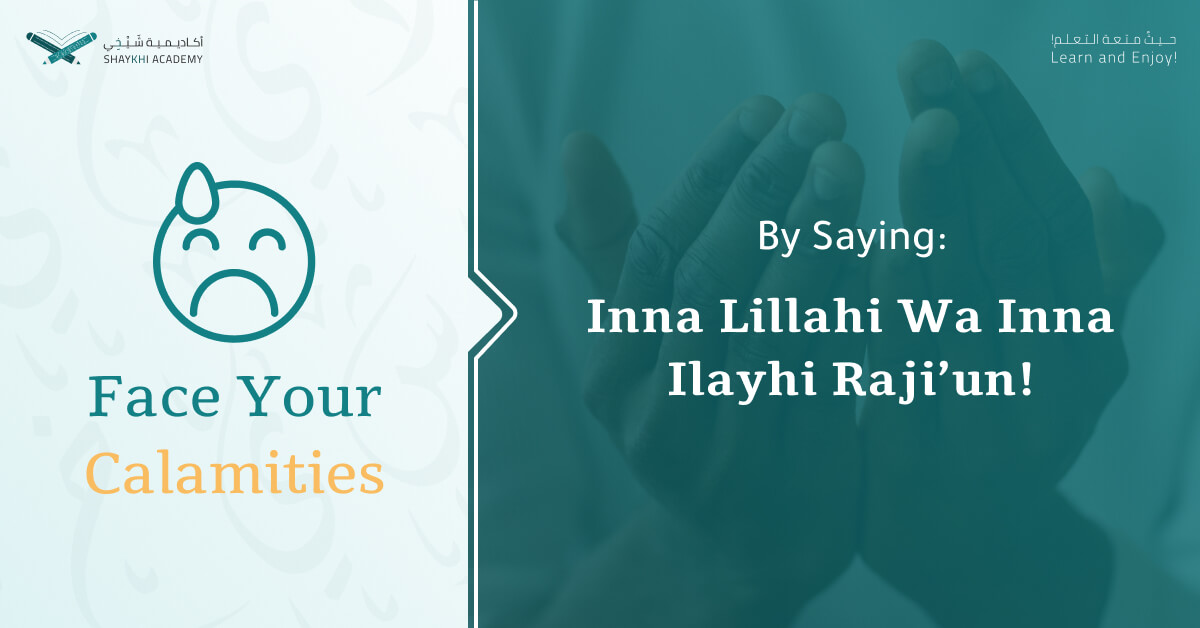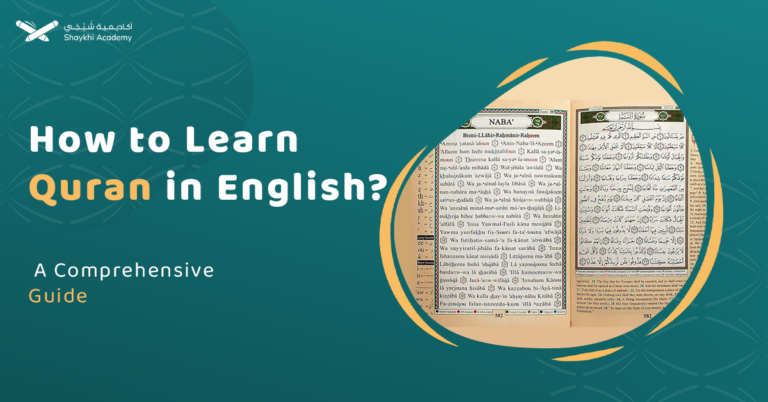Inna Lillahi Wa Inna Ilayhi Raji’un (إِنَّا لِلّهِ وَإِنَّـا إِلَيْهِ رَاجِعونَ) means “Indeed, we belong to Allah, and indeed to Him we shall return” and is often recited during calamities or loss. The correct transliteration is Inna Lillahi wa inna ilayhi raji’un, and it serves as a reminder that everything belongs to Allah and will return to Him. This phrase brings comfort to believers, fostering patience and trust in Allah’s wisdom during difficult times.
Inna Lillahi Wa Inna Ilayhi Raji’un is a sanctuary for those who have been afflicted by calamities. And calamity is any distress that befalls a person, no matter how minor, and it is likewise hated, as is anything that harms the believer.
Inna Lillahi Wa Inna Ilayhi Raji’un Dua Meaning In Arabic And English
Inna Lillahi Wa Inna Ilayhi Raji’un (إِنَّا لِلّهِ وَإِنَّـا إِلَيْهِ رَاجِعونَ) is a verse from the Quran (Surah Al-Baqarah, 2:156). Inna lillahi wa inna ilayhi raji’un in English means “We surely belong to Allah and to Him we shall return”.
Here’s the meaning in Arabic and English:
Arabic: إِنَّا لِلّهِ وَإِنَّـا إِلَيْهِ رَاجِعونَ
English Translation: “Indeed, we belong to Allah, and indeed to Him we shall return.”
This phrase is often recited by Muslims upon hearing about the death of a loved one or any major calamity, acknowledging that life and everything in it belongs to Allah and will ultimately return to Him.Meaning of Each Word in Inna Ilayhi Wa Inna Ilayhi Raji’un (In Arabic):
Let me first explain the meaning of each word of( إنا لله وإنا إليه راجعون )
Inna (إنا) = We are
Li-llahi (لله) = belong to Allah
Wa Inna (وإنا) = And we are
ilayhi (إليه) = To him
Rajiun (راجعون) = ReturningSo by saying “Inna lilah” it’s like you’re unifying and acknowledging royalty and slavery to Allah. And when you say “Wa inna ilayhi raji’un” you’re believing in the afterlife as well as that it’s Allah’s final decision, Sovereignty is his, and to Him, you will be returned (Indeed we belong to Allah and Indeed To Him We Will Return). Inna Lillahi Wa Inna Ilayhi Raji’un are just words that define the belief that everything is for God and that there is no way to escape from Him but to him.
What Is The Correct Transliteration of (إنا لله وإنا إليه راجعون)?
The most correct and close transliteration of (إنا لله وإنا إليه راجعون) is ( Inna Lillahi wa inna ilayhi raji’un )
How to Say Inna Lilahi Wa Inna Ilayhi Raji’un (In Arabic)?
First letter in ‘Inna’ is pronounced like ‘ɪ’ in the word ‘Hit’ , and the rest of the word ‘nna’ is basically ‘/ŋ/’ .
lilahi just like in Alhamdu-lilahi
ilayhi is pronounced like Elaai-he, and finally Raji’un which consists of 4 sounds; ‘Ra’ which is pronounced like /R/ , ji like /d͡ʒì/ , ‘U like the letter O in the English word ‘moon’ and N like the last letter N.What Is The Common Wrong Transliteration of (إنا لله وإنا إليه راجعون)?
(Innalillahi Wa Innailaihi Rojiun)
(ina lilah waina allah rajiun)
and (inna lillahi wa inallah e raji oon) are very wrong and common transliteration of the word, its (Inna lilahi wa inna ilayhi rali’un)
Benefits of Inna Lillahi Wa Inna Ilayhi Raji’un
Inna Lillahi Wa Inna Ilayhi Raji’un is the sanctuary for those who are afflicted by calamities, once you get afflicted and say Inna Lillahi Wa Inna Ilayhi Raji’un the devil won’t ever have power over you, nor whisper to you in a way that makes your calamities worse. Inna Lillahi Wa Inna Ilayhi Raji’un is the most powerful and useful solution for calamities, and it holds the meanings of goodness and blessing.
Allah SWT said (we shall certainly test you by afflicting you with fear, hunger, loss of properties and lives and fruits. Give glad tidings, then, to those who remain patient (2:156) those who when any affliction smites them, they say: “Verily, we belong to Allah, and it is to Him that we are destined to return (2:157) Upon them will be the blessings and mercy of their Lord, and it is they who are rightly guided. – al Baqarah
Inna Lilahi Wa Inna Ilayhi Raji’un Increases Your Faith
If you got to know the things people around you go through, you would have known that you’re in a good health and blessing, and thanked god no matter how big of a thing you’re going through.
You are not alone in your affliction, yet there is no affliction unless someone is more afflicted or hurt. If you’re sick in bed, some are neither alive nor dead, If you are poor and not lucky enough to provide for your essential needs; some people don’t even have a home to shelter. if you are broke, some are broke and suffering from debts. If your sleep is irregular, some do not sleep for more than one hour on successive nights.
The Blessing of a Faithful Heart
But the lucky person is the one whom Allah has given a faithful heart that’s always satisfied with whatever Allah gives, A happy person is the one who remembers what Allah blessed him with, forgetting what he has taken away, knowing that if he gets afflicted and said Inna Lillahi Wa Inna Ilayhi Raji’un, then he’ll be rewarded. life doesn’t even equal a cup of milk that he drinks while he is still in good health. our prophet peace be upon him, said: “Whoever among you wakes up in the morning secured in his dwelling, healthy in his body, having his food for the day, then it is as if the world has been gathered for him.'”
The Power of Patience and Faith
Rather, it is a shame and a dishonor for Muslims that there are individuals among the unbelievers who get affected by calamities and react by showing faith and patience, forgetting about it and carrying on with their lives, not expecting a reward for it. (if you suffer pain, then surely they also suffer pain as you suffer pain, and you hope from Allah what they do not hope; and Allah is All-Knowing, All-Wise). Al nisaa
Trust Allah’s Hidden Rewards
So be patient whenever you’re afflicted, and say Inna Lillahi Wa Inna Ilayhi Raji’un! Trust me If you knew what Allah has hidden for you, you would laugh out of joy! A second in Heaven will make you forget all the sufferings and calamities you’ve been through, whereas a second in Hell for the life enjoyer and wrongdoers will make them forget all the joy and bliss they’ve had.
Concepts The Afflicted Must Understand
Every village, every city, and even every home is afflicted by something. Some of them are afflicted only once, while others multiple times, and it does not stop until it affects everyone in the house. Inna Lillahi Wa Inna Ilayhi Raji’un includes two major concepts that if understood by the afflicted, can reduce the harshness of their pain, and they’re the following:
The First Major
To know that himself, his family, and his money truly belong to Allah and that Allah has given everything to him and made it with him just to enjoy it for some time, and then return it, because if a person was nothing before he was born, will be nothing when he dies, and if Allah is the one who created him from nothingness, then whatever he has is not his own, but rather the ownership of the one who created him out of nothing. so how can you be afraid of losing something you don’t own in the first place?
The Second Major
To know that a person’s fate is determined by Allah, and to him, you’ll be returned, alone, with good and bad deeds only, no family, money, or children. just as Allah created you the first time, so you must leave the world behind you since this is the start and end of a human.
You’re Not Alone
If the afflicted searches the world, he’ll find that everyone is afflicted, whether by the loss of a loved one or the incidence of something he despises. According to scholars, world happiness is like a vanishing shadow; if you laugh a little, you cry a lot, and if it lasts a day, it disappears an eternity.

“There has never been any laughter unless it was followed by crying“.
— scholars
Despite that, there is positive news for those who suffer calamities in the story of Umm Salamah, when she reported prophet Mohammed as saying, “If any Muslim who suffers some calamity says what God has commanded him, ‘Inna Lillahi Wa Inna Ilayhi Raji’un; O God, reward me for my affliction and give me something better than it in exchange for it’, Allah will give him something better than it in exchange.” When Abu Salama died she said, “What Muslim is better than Abu Salama whose family was the first to emigrate to God’s messenger? ”(He and his wife, Umm Salama, were among those who emigrated to Abyssinia. Abu Salama died of wounds received at the battle of Uhud, and the Prophet later married Umm Salama.) She then said the words, and Allah gave her prophet Mohammed in exchange.
What this means is that Allah’s saying: ﴾but give good tidings to the patient﴿ [Al-Baqarah: 155] is a reminder that the Almighty will replace the afflicted the same way he replaced Umm Salamah with the prophet Mohammed, peace be upon him, when she followed the Sunnah and said Inna Lillahi Wa Inna Ilayhi Raji’un
Muslims’ Manners When Affliction Occurs
“What did My worshiper say (when afflicted)?” Allah Almighty asks his angels, “Praise you” Angels reply, then Allah says, “Build him a house in Jannah and call it the House of praise”
There are some manners every Muslim must acquire during calamities, which are the following:
Patience
The greatest manner for a believer is to be patient when calamity occurs, and from this patience comes the ability to keep the heart from being unsatisfied, the tongue from complaining, and the body from doing things that upset Allah; such as slapping the cheeks, tearing the pockets, scratching the faces, plucking hair, and praying with the Dua of the ignorance. And patience must be when a believer first hears of the calamity, because our prophet, peace be upon him, said: Patience is only required during the first shock.
See The Good In It
Seeing the good in calamities is one of the best manners of a believer. May God have mercy on Ibn Taymiyyah, who reported that the wrongful sect killed Hussein bin Ali on the day of Ashura, Hussain was honored and martyrdom to Allah, just as he was honored by his family’s most honorable member. He honored Hamzah, Ja’far, his father Ali, and others, and his death was one of the reasons Allah raised his rank, Hussain and his brother Al-Hassan are the youth of Paradise, and high top ranks that not been met except by affliction. For even if Hussein’s death was horrible, it was still good and honorable for him.
Mus’ab bin Sa’d narrated from his father that a man said: “O Messenger of Allah! Which of the people is tried most severely?” He said: “The Prophets, then those nearest to them, then those nearest to them. A man is tried according to his religion; if he is firm in his religion, then his trials are more severe, and if he is frail in his religion, then he is tried according to the strength of his religion. The servant shall continue to be tried until he is left walking upon the earth without any sins.”
Remember That It’s All Determined
When a Muslim is certain that these calamities are written and determined, and all what God has commanded must be a reality with no escape, realizing that Allah has wisdom in causing these calamities, then all the sufferings will become easier for you.
Make Dua
When calamity occurs, say Inna Lillahi Wa Inna Ilayhi Raji’un. our prophet peace be upon him said “If any Muslim who suffers some calamity says what God has commanded him, ‘Inna Lillahi Wa Inna Ilayhi Raji’un; O God, reward me for my affliction and give me something better than it in exchange for it’, Allah will give him something better than it in exchange.”
Avoid What Upsets Allah
And that is a kind of badly exposing, slapping, tearing one’s pockets, shaving one’s hair, crying, complaining to people, praying for death, and so on. All that upsets Allah SWT, so avoid it and replace it with patience.
By the end of our article I pray to god to always keep you smiling.
Recources:
وقفات مع آداب الإسلام في المصائب
إنا لله وإنا إليه راجعون ملاذ ذوي المصائب
لست وحيدًا في المصائب
The translator:
Raghad Qasim
Conclusion
Inna Lillahi Wa Inna Ilayhi Raji’un is a phrase from the Quran, meaning “Indeed, we belong to Allah, and indeed to Him we shall return.” It is recited by Muslims when facing calamities or the death of a loved one, as it reflects the belief that everything belongs to Allah and will return to Him. This phrase brings comfort to believers, reminding them of Allah’s sovereignty and the temporary nature of life’s trials.
By reciting Inna Lillahi Wa Inna Ilayhi Raji’un in times of hardship, believers affirm their faith, seek patience, and trust in Allah’s wisdom. It shields them from despair, reassures them of rewards in the hereafter, and encourages reliance on Allah in all circumstances.
FAQ
(Q&A of Inna Lillahi Wa Inna Ilayhi Raji’un)












































